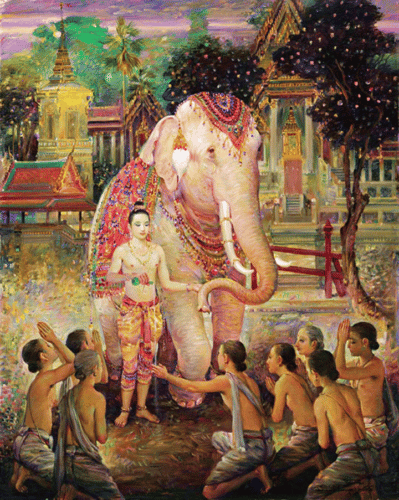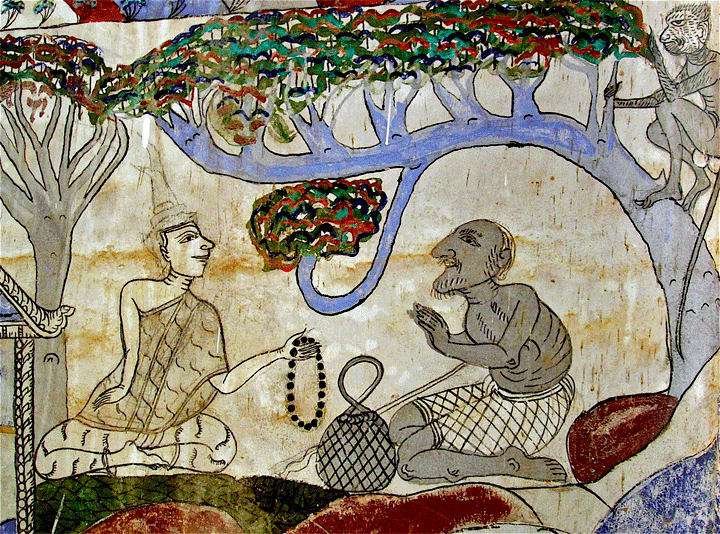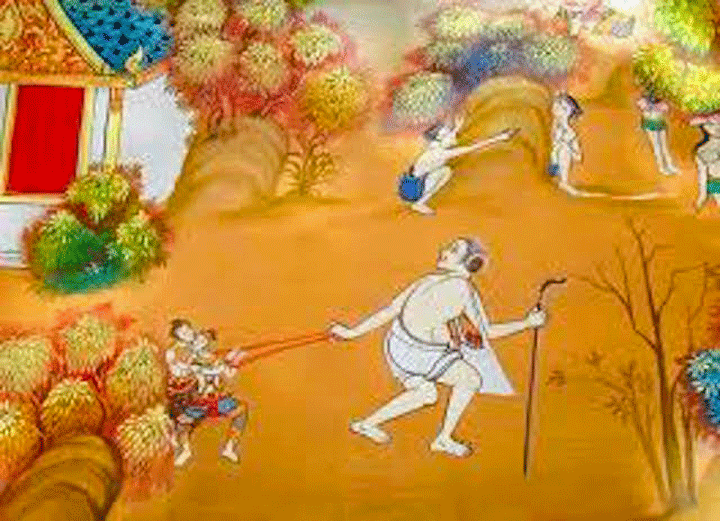Mahachat, the 'Great Birth', and its celebration

The White Elephant is given away. Protests follow
Mahachat, the penultimate birth of the Buddha, is the story of the generosity of Prince Wetsadorn Chadok (usually called Prince or Phra Wet for short) who gives away everything, even his children and his wife in the end. The adventures of Chuchok, an old rich beggar with a beautiful young woman is part of this story.
A few days ago I had to wait for my son to take an English test at the British Council in Chiang Mai. I got into a conversation with a man who was the same age as me, who was chaperoning his grandson. I asked him about the Mahachat. He completely revived. He was born in Yasothon (Isan) and often attended this festival, one of the highlights of the Isan year and of his life, he said. He told how the audience reacted with 'awhy', emotion. They laughed, cried, got angry and clapped their hands. It often reminded them of their own lives, the highs and the lows, he said.
The Jakata Stories
There are 547 Jakata stories circulating that tell of the past lives of Siddhartha Gautama, all of which contributed to his enlightenment after which he was called the Buddha. However, the 10 last births are the most famous. Each of those stories and lives is about a virtue that contributes to our humanity and that can eventually lead to enlightenment (Nibanna or Nirvana). The last 10 lives are about selflessness, strength, benevolence, perseverance, insight, morality, patience, equanimity, truth and finally generosity. The last important virtue in Buddhist thought, generosity, is the subject of the story 'Mahachat' (note 1). This one is known and loved in all Buddhist countries
That generosity is not completely altruistic, because you gain merit with it, which in turn benefits your karma and thus guarantees a better reincarnation.
The 'Mahachat'
This is the story of Crown Prince Wetsandon Chadok. When his mother went out to visit the queen in town, she unexpectedly gave birth in the middle of a market. That is why he was called 'Wetsandon' or 'Vessantara' which means: 'born in a merchant's quarter'. On that same day, a white elephant calf was born.
From an early age, Prince Wet was very generous. He gave away everything that was asked of him and his father and mother helped and supported him in this. He married Princess Madri and they had two children, a boy and a girl. Prince Wet ascended the throne.
A neighboring king whose realm was experiencing a severe drought came to ask King Wet for the white elephant that can bring rain. King Law gave him the beast. His subjects and his father were very angry about this, so King Wet returned the kingship to his father.

Prince Wet gives a rosary to a beggar
Prince Wet and his family decided to retreat into the wilderness, but before leaving he gave all his gold, jewels and other possessions to his subjects. On his way through the jungle, he first donated his horses and then his carriage to people who asked for it. The prince and his family lived like hermits.
Let's introduce Chuchok. Chuchok was a Brahmin, a Hindu priest, and got rich by begging. He was an old man, hunchbacked, bald and walking with a cane. One day he asked a friend to keep his fortune while he continued begging. When he returned, it turned out that his friend had squandered his entire fortune. Don't worry, his friend had a young and beautiful daughter named Amittada, whom Chuchok gladly accepted in lieu of his money. The villagers were jealous and started to bully Amittada, making her afraid to leave the house. She begged her husband for servants and Chuchok finally gave in and went looking. Chuchok had heard of a Prince Wet who gave everything away and had two children. After many adventures in the forest, he reached Prince Wet's hermitage and asked for his two children. In a dramatic scene, the prince manages to convince his reluctant wife that this sacrifice will bring great merit.
The god Indra knew that Prince Wet would also give away his wife, the last thing he had left. He took the form of an old Brahmin and asked Prince Wet for his wife. Prince Wet agreed whereupon the god Indra revealed his true nature, returned his wife to Prince Wet to take good care of.
Meanwhile, Chuchok drove the two children through the forest on their way home with much scolding and beating. But he got lost and ended up in the city of Prince Wet's father. The old king recognized his grandchildren and offered Chuchok money to get the children back. Chuchok took the money, indulged in such a lavish meal that he burst and died. The old king forgave his son the gift of the elephant and then with a procession of courtiers went in search of him and asked him to return as king to which Prince Law agreed. The people received them with great joy and elaborate festivities.

Chuchok with the two prince children
The 'Thet Mahachat' Festival
After the end of the Buddhist rain retreat and after the harvest (late October), this story with its many dramatic and humorous scenes, its noble and less noble sentiments and beautiful descriptions of nature is enacted in a temple for several days of celebration. It is called the 'Thet Mahachat' festival. (note 2)
The whole story is divided into 13 episodes, 'kan' in Thai, and can last several hours, a day and sometimes a day and night depending on how many 'kan's are sung and/or read. The whole is framed with music and dance.
At the start of the party, there are processions in which images from the story are carried, sometimes in the form of a meter-long cloth.
Nuts
1. Mahachat (มหาชาติ pronounced máhǎachâat): maha is 'great' and chat 'birth' (and nationality). Jakata is related to it and also means 'births'). Usually referred to as the 'Vessantara Jakata' in the literature.
2. Thet (เทศน์ pronounced thêet) is a sermon but also a discourse and speech
3. Chuchok amulets are highly sought after. They bring fame and fortune.
This is how the Mahachat is sung, it takes three hours but listen along, with beautiful images from the story as illustration: www.youtube.com/watch?v=YFqxjTR4KN4
Enjoy the following video about a Chuchok shrine in Bangkok where he is celebrated in a Thai way. To look! www.youtube.com/watch?v=esBSBO_66ck


If Prince Wet is meant to convince me of the virtue of generosity, he will not quite succeed. He gives his children away, what they think of it is not mentioned at all. I don't think an educator will get excited about this. He asks his wife for permission before he gives them away. This would bring great merit to them. For him and his wife? Well, just like with us in the Middle Ages, little attention was paid to the emotions of children ala.
Then he also gives away his wife (does he ask her permission?) but luckily Indra made herself known!
The latter has clear similarities with Abraham who (almost) sacrifices his son.
Moreover: it is not true altruism, as Tino rightly points out. After all, a reward is promised.
Most religions preach generosity and promise a reward for it.
Shows insight into the true nature of man. You only give something away if there is something in return. Just horse trading. At least gratitude or a good feeling on the part of the giver. But a place in heaven or a better rebirth after a large temple donation is certainly never gone!
Thanks again Tino.
From February to August 2016, the Museum of Ethnology hosted an exhibition on Buddhism. Several countries were discussed, including of course Thailand. There was, among other things, a meter-long cloth with this story on it, as well as a mini documentary about the celebration of this feast, where the youth goes to the temple with this meter-long cloth every year. It was a beautiful exhibition, it took me all day to listen to and read all the information. Would have preferred to go there with my love, of course, we could have talked longer about the presentations.
Website about the exhibition, including a video in which you can also see this canvas:
https://volkenkunde.nl/nl/de-boeddha
I now read that the exhibition has been continued in Amsterdam (Tropenmuseum) from September 23, 2016 to January 29, 2017:
“The successful exhibition The Buddha – from life story to source of inspiration will travel to the Tropenmuseum in Amsterdam. In 5 months time, the exhibition has attracted more than 70.000 visitors in Museum Volkenkunde in Leiden. This extensive exhibition about one of the most inspiring figures in world history can be seen in the Tropenmuseum from 23 September. (…)
The exhibition features approximately 100 Buddha statues. One of these is a Buddha statue from Nepal that was donated to the museum by the Nepalese embassy last May. Never before have so many Buddha statues been exhibited at the same time in the Tropenmuseum. There is also a rare, more than 35 meters long Vessantara cloth with scenes from a previous life of the Buddha. Together with unique international masterpieces from, among others, the Victoria & Albert Museum in London, the Berlin Museum of Asian Art and the Asian Civilizations Museum in Singapore, these objects tell the life story of the Buddha.”
Source: https://tropenmuseum.nl/nl/pers/tentoonstelling-de-boeddha-reist-naar-tropenmuseum
Imagery:
https://volkenkunde.nl/nl/pers/de-boeddha
Even better, there is a PDF report that shows and treats various scenes from this canvas. Background information Vessantara cloth:
https://volkenkunde.nl/sites/default/files/Achtergrondinformatie%20Vessantara%20doek.pdf
I really love it, dear Rob, that you post this extra information! Especially that last PDF with those beautiful images from the story should be viewed by everyone.
This also shows what a beautiful culture the Isaan has if you go a little deeper. In many ways more beautiful and appealing than Bangkok.
And another stupid mistake, sorry.
It is not 'Jakata' but 'Jataka' similar to the Thai 'chaat' (falling tone): birth.